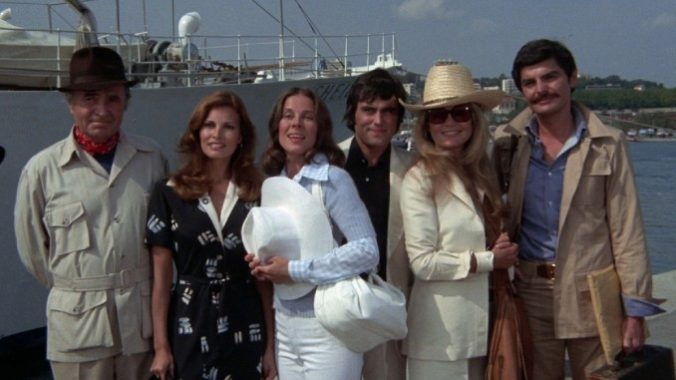The Last of Sheila: The Best Whodunit You’ve Never Seen Turns 50

If you saw last year’s delightful Glass Onion: A Knives Out Mystery, you may have noticed with bittersweet relish one of the film’s most memorable cameo appearances: Stephen Sondheim, in what would turn out to be his last screen appearance, filmed shortly before his death in November of 2021. It’s a nice moment, particularly in light of losing the legendary composer, but it’s also a fitting tribute to the co-writer of one of the film’s chief influences.
No, I’m not talking about a musical. Though Sondheim is best known for classics like Sunday in the Park with George and Into the Woods, he’s also one of the brains behind what’s stealthily become one of the most influential mystery films ever made, a movie so beloved by Glass Onion writer Rian Johnson that he basically took the whole set-up and made it his own.
“It’s a great murder-mystery, but the main thing that I took from it was the idea of a rich jerk inviting all of his friends out to an exotic locale for a murder-mystery game,” Johnson told Deadline last year. “Within that, there’s also the hierarchy of a group of friends, with somebody at the top of the pyramid, and everyone having a reason to bump them off, and the way that money plays into that.”
The film in question is 1973’s The Last of Sheila, written by Sondheim and Psycho star Anthony Perkins and directed by Sondheim’s fellow theatrical legend Herbert Ross. Like Glass Onion, it’s a film in which a star-packed cast heads to a beautiful location and gets embroiled in a twisty whodunit. But 50 years after its debut, there’s so much more to the movie than its symmetry with a recent mystery classic. Adored by Johnson, Edgar Wright and many other filmmakers, it’s spent the last five decades growing into a must-see whodunit that too many people still haven’t seen, the kind of hidden gem that slowly reveals itself to be one of the smartest, most fun films of its kind.
Sheila Greene (Yvonne Romain) is a gossip columnist, murdered in a hit-and-run after leaving a Hollywood party a year before the film. In the present day, Sheila’s husband, movie producer Clinton (a gleeful James Coburn), has invited six of Sheila’s closest friends to his yacht in the south of France for a weeklong series of parlor games. Thanks to Clinton’s machinations, each of the invited guests—director Philip (James Mason), actress Alice (Raquel Welch), Alice’s husband and manager Anthony (Ian McShane), agent Christine (Dyan Cannon), screenwriter Tom (Richard Benjamin), and Tom’s heiress wife Lee (Joan Hackett)—has been given an envelope containing a secret, and the goal of the game is for the other five players to determine who’s holding which secret. It’s billed as the “Sheila Greene Memorial Gossip Game,” and it’s all set up as a bit of fun framed around six exotic Mediterranean ports.
-

-

-

-

-

-

-

-

-

-

-

-

-

-

-

-

-

-

-

-

-

-

-

-

-

-

-

-

-

-

-

-

-

-

-

-

-

-

-

-








































